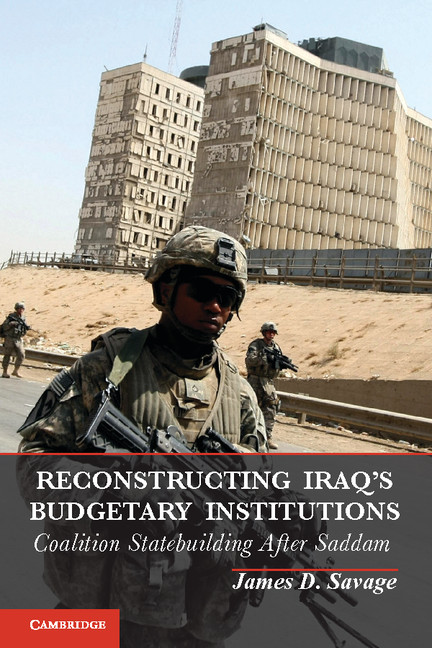When University of Virginia politics professor James Savage set out to study Iraq’s postwar effort to rebuild its budgetary institutions, the rising sectarian violence in the country prevented him from embedding himself within its financial ministries.
Yet Savage, an expert on comparative budgeting theory and fiscal policy who spent time abroad for past research projects within the budgetary institutions of Japan and the European Union, overcame those hurdles by building a network of contacts inside and outside Iraq. Those efforts led to a wide-ranging series of interviews with officials from within the Iraqi government, as well as with former officials from the Coalition Provisional Authority that oversaw Iraq’s political transition, officials from the U.S. State Department, the U.S. Treasury Department and other U.S. agencies and contractors working within the country.
Savage’s efforts eventually led Iraq’s Institute for Economic Reform and the United Nations to invite him to visit Iraq in July to make a presentation to the High Committee of the Council of Ministers on improving the country’s budgetary process. Next month, his new book exploring the U.S.-led coalition’s efforts to rebuild those financial institutions in the wake of the 2003 toppling of Saddam Hussein’s regime, “Reconstructing Iraq’s Budgetary Institutions: Coalition State Building After Saddam,” is scheduled to be published by Cambridge University Press.
“It’s the story of one of the key elements of the effort to build up the Iraqi state after the invasion,” Savage said. “It’s a story that’s filled with some successes and some disappointments as you might expect with what’s going on over there. Budgeting is a core element of government, and if you can’t budget right, then you can’t do anything else much effectively.”
Earlier this month, Savage’s expertise earned him the Aaron B. Wildavsky Award for Lifetime Scholarly Achievement in the field of public financial management. The award was presented by the Association for Budgeting and Financial Management, one of the highest honors someone working in the area of public budgeting and finance can receive.
One of his U.Va. colleagues, Edward R. Stettinius Professor of American History Melvyn Leffler, praised Savage’s new book as “one of the best books yet to appear on postwar reconstruction amidst insurrection.”
“Savage has done a meticulous job of research and has conducted many revealing interviews to illuminate the challenges of rebuilding the finances of Iraq,” said Leffler, who has written numerous articles on the United States’ relations with Iraq during President George W. Bush’s administration.
Savage’s book argues that budgeting is a core activity that’s essential to the operation of a functional government. He explores the historical origins of Iraq’s budgetary institutions, back to its Ottoman, British and Ba’athist roots. While his research sheds light on the problems of outside authorities engaged in state-building efforts, such as the Coalition Provisional Authority, Savage said the budgetary process introduced by the CPA offered a source of institutional stability in the midst of insurgency, sectarian division, economic uncertainty and occupation.
From a political perspective, all factions in Iraq depend on the budget and the resources it allocates. There may indeed be a coincidence of interests that accounts for institutional change in Iraq, Savage said, to the point that the Iraqis have come to rely on the budget process as a mechanism for compromising on some of the deep divisions that plague the country.
Since 2004, Iraq has successfully passed nine budgets, including the adoption of the 2013 budget. Each of those was crafted under the budgetary procedures established by the Coalition Provisional Authority, Savage said.
“In many cases, the Iraqis rejected or passively opposed the Coalition’s various administrative capacity-building programs and the contractors who managed them,” he said. “They have, however, taken ownership of [the CPA’s] Order 95, and they have used it as the legal framework for their budgetary process.”
Under its new framework, Iraq has expanded the decision-making process to lower levels of government, Savage said. During Hussein’s regime, only top Iraqi government officials were empowered to make even rudimentary budgetary and programmatic choices, he added, which led to a lack of initiative throughout the government’s ranks. “In a contemporary sense, they have acknowledged that the caution that permeated the bureaucracy is still in place. So they have problems executing their budget, in other words, launching their projects once they’ve determined, ‘Here’s what we’re going to do, what we’re allocating money for,’” Savage said. “The normal procurement, transaction, contracting and cash-management issues are still pretty basic.
“But they have taken control of the process, and they are starting to think about what they could do to modify if for their needs, and I think it’s a healthy development for them. They’re a long way away from being able to pull it off, but I think generally they’re on the right path.”
Media Contact
Article Information
October 28, 2013
/content/uva-professor-s-book-analyzes-coalition-and-iraq-s-efforts-rebuild-national-budget

